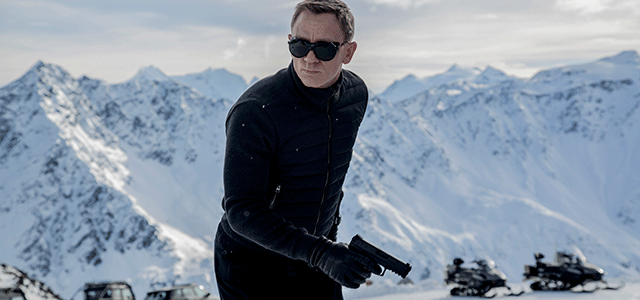
The 25th James Bond movie No Time To Die arrives in Cineworld in September, and we're counting down the days by revisiting all the 007 movies in chronological order of release.
In honour of Daniel Craig's swansong as 007, we're taking a nostalgic trip back through time. Next up: Daniel Craig's fourth Bond movie, Spectre.
What is the story of Spectre?
James Bond is on assignment in Mexico, tasked with eliminating a man named Sciarra. With the target eliminated, Bond takes the man's signet ring, which is engraved with a signature octopus logo. Bond was covertly assigned the mission by his late superior M (Judi Dench), who suspected Sciarra of being a link in the chain of a nefarious criminal organisation.
007 travels to Rome to meet the dead man's widow, Lucia (Monica Belucci), who points him in the direction of a clandestine cabal of assassins. The meeting is presided by a mysterious individual subsequently revealed to be Franz Oberhauser (Christoph Waltz), a man with unique personal ties to Bond.
The international journey then leads Bond at first to the Pale King/Mr. White (Jesper Christensen), a former member of Quantum and now the target of assassination by Oberhauser. In turn, White points Bond towards his daughter, Dr Madeleine Swann (Lea Seydoux), who identifies Oberhauser's organisation as SPECTRE. Bond soon realises that all of his recent targets, Le Chiffre, Dominic Greene and Raoul Silva, were being orchestrated from on high by the nefarious Oberhauser who has diabolical plans for Britain's greatest secret agent.
How did Spectre get made?
Three movies in, and Daniel Craig had cemented himself as a James Bond par excellence. Beginning with 2006's Casino Royale, Craig reestablished grace notes of vulnerability and pain in the 007 character, ditching the cartoonish aspects of Pierce Brosnan and Roger Moore to harness both the grittiness of Timothy Dalton and the confidence of Sean Connery. That said, Craig's tenure as 007 was as patchy as his predecessor's: following Casino Royale's runaway success, 2008's Quantum of Solace was seen as a disappointment. The scales were righted again in 2012 when Skyfall emerged as a confident, handsome-looking blockbuster that delved into Bond's backstory with engrossing results.
if there's a pattern to Craig's time as Bond, it's that the odd-numbered movies are great and the even-numbered ones not so good. Sadly, this turned out to be the case with Spectre, the 2015 follow-up to Skyfall and a movie that was burdened with, frankly, impossible levels of expectation. Skyfall had not only grossed $1 billion worldwide but was also seen as a rare artistic success for the Bond universe, telling a profoundly human story by drawing on superior craftsmen including director Sam Mendes, cinematographer Roger Deakins and composer Thomas Newman.
Given Skyfall's success, it was inevitable that producers Barbara Broccoli and Michael G. Wilson were keen to reinstate Mendes behind the camera. However, so exhausting is the experience of making a Bond film that Mendes expressed reluctance to return; in early 2013, still basking in the wake of Skyfall's release, Mendes said he had no interest in helming the 24th Bond movie. However, he later recanted, saying that he found the script, from Neal Purvis, Robert Wade, John Logan and Jez Butterworth appealing. Mendes also promised "more mischief", and this certainly bears out in the finished movie, which showcases a level of goofiness more akin to the Roger Moore years.
Mendes also promised direct continuity with the events of Skyfall, which would be assisted by a host of returning faces including Ralph Fiennes as the newly instated M, Naomie Harris as Moneypenny and Ben Whishaw as Q. Up until Quantum of Solace, it was relatively unusual for Bond movies to feed off one another, although in that instance it only came about because of disastrous problems with the script. Spectre would eventually become the first Bond movie to effectively 'ret-con' the events of the preceding Bond movies (in other words, it would appropriate the events of those films and alter our emotional understanding); sadly, this fails to convince in the finished product.
The movie's usage of the term Spectre, in reference to the nefarious criminal organisation, only came about after complex legal issues had been resolved. These technicalities stretched back to the 1960s when producer Kevin McClory sued Bond author Ian Fleming over rights towards certain elements present in the latter's novel Thunderball; the outcome was McClory took ownership of the Spectre name and its associated connotations, effectively barring Bond's parent companies Eon and Danjaq from using the brand.
When McClory died in 2006, and the legalities were resolved in 2013, the way was open for Spectre and its sinister figurehead Blofeld to step back into the fold. There are trace elements of other Fleming works in the script, notably the presence of Franz Oberhauser, the Spectre chief played by Christoph Waltz who later mutates into Blofeld as per the film's narrative.
Oberhauser's father Hannes is mentioned in Fleming's short story 'Octopussy', and is identified in the film as having been Bond's temporary legal guardian. This meshed with Mendes' desire to explore more of Bond's backstory. He wanted to focus on the notion of "a natural child who had been pushed out, cuckoo in the nest", a plot development that eventually led to the creation of the character of Franz.
That said, pre-production on the film was troubled when the 2014 Sony email hack revealed growing frustrations regarding the film's budget. The final cost of Spectre (whose title was revealed at a November 2014 press conference) was estimated between $250 and $300 million, making it one of the most expensive Bond movies to date. Despite the movie's impressive surface gloss, boosted by the presence of Christopher Nolan's regular cinematographer Hoyte van Hoytema (2014's Interstellar), one senses that Mendes' heart wasn't truly in this one, resulting in a tonally confused experience that flip-flops between Craig-era grittiness and Brosnan-period silliness.
Principal photography commenced in December 2014 and, as one would expect, encompassed a dizzying array of locations. One of the most challenging environments to secure was the bustling Italian capital Rome, where the production planned a car chase between Bond and Spectre henchman Hinx (Dave Bautista, channelling Richard Kiel's Jaws).
Planning the sequence proved to be a real headache for the crew with numerous local organisations turning out to protest the sequence. There was genuine anxiety that damage would be done to priceless local architecture, forcing effects supervisor Chris Corbould, a Bond veteran, plotting a uniquely singular route and even padding out steps over which the cars would drive.
According to chief stunt coordinator Gary Powell, filming the chase had the "risk of skidding into the Vatican", and led to "a record for smashing up cars in Spectre—seven Aston Martins in all," with the film's car expenses estimated at £24 million ($48 million).
It's perhaps little surprise that the pitched battle between 007's gadget-equipped Aston Martin DB-10 and Hinx's Jaguar C-X75 is visually stylish but lacking in tension, involving lots of power sliding around oddly deserted streets but no real sense of grittiness. This is, unfortunately, an emblem for much of the movie: the sheer logistical mechanics of the production swamp the human nuances present in both Casino Royale and Skyfall.
One of the film's most complex sequences is the opening one, involving Bond preparing to assassinate Sciara in the midst of the Mexican Day of the Dead celebrations. It's accomplished by a technically dazzling, sustained tracking shot, picking a masked Bond out of the crowd of revellers, following him inside a building, and then back outside along a rooftop where he prepares to make his kill.
The scene was originally conceived as an action-packed one, but had to be changed to something more stealthy when Daniel Craig did substantial damage to his leg. Craig had injured himself on the previous Bond films but this was decidedly more serious: faced with the prospect of shutting the production down for nine months or ploughing on, he chose the latter. For much of the film, he's propped up by a mechanical leg brace that allows him to participate in much of the stunt work. Nevertheless, it was clear that the emotional and physical demands of the role were beginning to take their toll.
The real problem with Spectre, however, is its patchiness, particularly when introducing Blofeld. Bond's most iconic nemesis fails to generate any significant menace when imagined by Christoph Waltz, odd when considering his Oscar-winning role in Quentin Tarantino's Inglourious Basterds. It's not so much Waltz's fault as that of the overall conception; when Blofeld finally appears out of the shadows, wearing slippers and the retro onesie sported by Donald Pleasence in You Only Live Twice (1967), it's hard to determine whether the film is going for campiness or seriousness. The presence of earlier series iconography like a white cat, plus Austin Powers-style dental laserbeams, only heightens the confusion.
Such sequences sit alongside other set-pieces of genuine impact. A train fight takes the principle of From Russia with Love (1963) to the nth degree, fashioning a genuinely brutal beatdown between Bond and Hinx where 007 is, for once, genuinely outmatched by his opponent. Bautista's hulking size is well-emphasied by the claustrophobic environment, making one lament that the film didn't feature him more often.
A later sequence involving Bond intentionally crashing a plane in the Austrian alps hits Pierce Brosnan levels of nonsense, ironic given that Craig's films initially steered as far away from that aesthetic as possible. The attempts to substitute the memory of Eva Green's Vesper Lynd with another romantic interest, Dr. Madeleine Swann (Lea Seydoux), are only halfway effective because we keep being distracted by the whiplash changes in the film's tone. Meanwhile, an undercooked sideplot involving M's conflict with bureaucrat C (Andrew Scott), who is launching an insurgent takeover of MI6, never really catches fire, drawing unfavourable comparisons with the superior material in Marvel's Captain America: The Winter Soldier (2014).
What really disappoints in Spectre, however, is the missed opportunity to exploit Blofeld as the self-described "author of all [007's] pain". The retro-fitted explanation that Blofeld orchestrated all of Bond's previous nemeses, Le Chiffre, Dominic Greene and Raoul Silva, arrives far too late into the narrative, and in too rushed a manner, to ever convince fully. It's not helped by the climactic sequence whereby Bond returns to the devastated remains of the MI6 building and has literal arrows pointing his way back through events in recent franchise history; one can really hear the plot mechanics grinding.
It's a shame as there's a lot to commend Spectre, from the usual Bond sweep to the intermittently effective action sequence and the odd moment of sly, well-judged humour. (Bond ejecting from his Aston Martin and calmly landing with his parachute in the middle of a Rome street.) By this stage in the history of the Bond franchise, we've come to expect a certain level of scale and professional oversight, and that's what we get as the film dutifully ticks off the expected ingredients (guns, girls, gadgets, cars, explosions, villainous hideouts).
However, there's never a sense that it's going anywhere new, despite the script making heavy weather of Bond and Blofeld's connection. For his part, Craig confessed to being exhausted with the Bond role, controversially admitting in an interview that he would rather "slash his wrists" than play Bond again. However, given the subsequent warmth he has expressed towards playing the character again in No Time To Die, one suspects that this was merely a hot-headed, reactionary response to Spectre's challenging production. (Craig later said his comments were "stupid".)
Mendes also expressed frustration with the Bond production machine, stating in 2019: "It’s just so hard. You feel like the England football manager. You think, if I win, I’ll survive. If I lose, I’ll be pilloried. There is no victory. Just survival." Perhaps these behind the scenes stresses explain odd choices such as the neglect of Monica Belucci as the haunted Lucia Sciarra; it strikes a sour note that Bond sleeps with her in exchange for information, only for the character to be summarily discarded from the narrative in the manner of the Roger Moore films. (Belucci had been lined up for the role of Paris Carver in 1997's Tomorrow Never Dies, a part that eventually went to Teri Hatcher.)
Clearly, the making of Spectre was tumultuous and exasperating for all involved. That said, there's no denying how much Craig and Mendes galvanised the 007 template during the two movies they made together. Bond is a franchise that has always had to evolve, and in an era of mega-budget superhero blockbusters, they helped reinforce Bond's relevance, to variously brilliant (Skyfall) and middling (Spectre) degrees.
READ MORE
- No Time To Die and the 6 James Bond movies we never got to see
- 7 actors who could play James Bond after Daniel Craig retires
- Shaken and stirred! Daniel Craig's defining 007 moments
What music is on the Spectre soundtrack?
Spectre became just the second Bond movie to win the Oscar for Best Original Song. It went to Sam Smith whose distinctive falsetto adorns the title track 'Writing's on the Wall' (one imagines that getting something to rhyme with 'Spectre' was a bit of a challenge). Smith collaborated with his regular partner Jimmy Napes, reportedly writing the song in under an hour. It was released in September 2015, two months ahead of the movie, and replaced a proposed song from Radiohead, 'Man of War', which had originally been written in the 1990s. Despite Smith's success, the somewhat dreary, turgid nature of 'Writing's on the Wall' could never hope to attain the piercing insight or power of Adele's 'Skyfall'.
Given Mendes' presence behind the camera, it was inevitable that composer Thomas Newman would also return. Despite being one of the most acclaimed and distinctive composers in Hollywood, with a uniquely atmospheric musical signature, Newman divided opinion with his Skyfall score. The soundtrack's largely introverted and moody nature was of a piece with Newman's wider career and also the emotional needs of Skyfall's narrative, but it perhaps lacked that crowd-pleasing punch of Newman's predecessor, David Arnold.
People doubled down on their criticism of the Spectre score, which tracks in wholesale passages from the earlier Skyfall. If one is being charitable, one could say that given Spectre's continuity with the earlier movie, it makes sense to replicate certain musical movements, perhaps to suggest that history is catching up with 007 in drastic and dangerous ways. If one is feeling less generous, the accusation is that Newman is bored and out of ideas.
Nevertheless, the level of instrumental and harmonic detail is remarkable, even in a somewhat subpar Newman offering. His attention to musical nuance remains outstanding, blurring the lines between organic and synthetic to often dazzling degrees. The rowdy percussion in the opening Mexico sequence gives way, controversially, to tracked-in action music from Skyfall's opening train chase. Likewise, the Rome car chase, named 'Backfire' on the album, chugs along with a resonant French horn motif and a spine-tingling choir (overtones of 1979's Moonraker), but also draws overt attention to the rhythmic material from Skyfall. (The groovy bass flute during the parachute-laden climax is a neat homage to John Barry.)
Newman's capacity for alluring and eerie textures enchants in many areas. The sequence where Bond and Madeleine discover the 'Secret Room' in the hotel L'Americain uses ghostly piano chords and suspensions to indicate latent emotional grief and loss. And when he does impose himself on the action sequence, he does so with gusto: the relentless assault of 'Snow Plane' sees Newman pushing himself to remarkably aggressive degrees, not what we'd expect from the composer of The Shawshank Redemption (1994) and other acclaimed drama works.
Nevertheless, the music, like the movie, is caught at a crossroads point between the old and the new. The action music is thrilling and the incidental emotional sections are alluring, but haven't we heard it all before? It's a shame that Newman wasn't involved with Smith's song as the melody could have been incorporated into the underscore to give it some more ballast; this was a problem that had blighted both Skyfall and Quantum of Solace before it.
Fortunately, confidence appears to have been restored in No Time To Die, as composer Hans Zimmer has been actively involved with Billie Eilish's opening title number; fingers crossed this will help forge greater continuity between the opening credits and the music as heard throughout the rest of the movie.
How was Spectre received?
As is usual with the Bond franchise, the marketing blitz began well in advance of the movie's release date. During the December 2014 press conference announcing the start of filming, Aston Martin and Eon unveiled the new DB10 as the official car for the film. The DB10 was designed in collaboration between Aston Martin and the filmmakers, with only 10 being produced especially for Spectre as a celebration of the 50th anniversary of the company's association with the franchise.
The movie's world premiere took place at London's Royal Albert Hall on 26th October 2015. Following Skyfall's success with its IMAX presentation (it was the first Bond movie to be released in the format), Spectre expanded its IMAX roster to 40 screens, as opposed to the earlier film's 21. The movie's eventual worldwide gross was $880 million, less than Skyfall but still profitable enough against its large budget to be considered a hit.
Critics, however, were not so kind to this film as they were towards Skyfall. On balance, the UK response was slightly more favorable, perhaps a result of Bond being a longstanding British institution. The Guardian's Mark Kermode gave the film four out of five stars, observing that the film was a step down from Skyfall but still delivered the franchise goods.
Likewise, Rolling Stone's Peter Travers gave the film 3.5 stars out of 4, describing Spectre as "party time for Bond fans, a fierce, funny, gorgeously produced valentine to the longest-running franchise in movies". On the other hand, Variety's Guy Lodge lamented the absence of any genuine emotional stakes: "What's missing is the unexpected emotional urgency of Skyfall, as the film sustains its predecessor's nostalgia kick with a less sentimental bent."
With this movie, Sony's contractual ownership of Bond came to an end; they had taken charge with 2006's Casino Royale, and upon their departure, a fierce bidding war took place as to who would claim the next Bond movie. Universal eventually triumphed to claim distribution rights of No Time To Die, although it was only a single-picture deal. One waits to see where the Bond franchise will go in the future.
When is No Time To Die released in the UK?
Click here to book your tickets for No Time To Die, which is released on 30th September. Don't forget to tweet us your favourite James Bond movies @Cineworld.

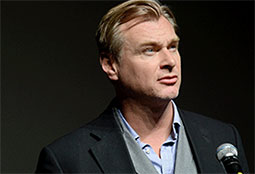

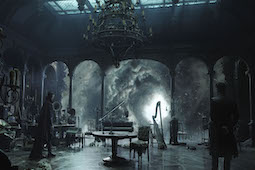
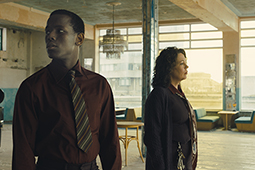
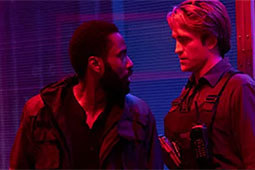
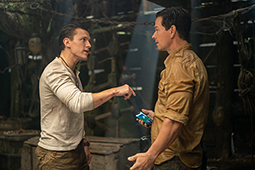
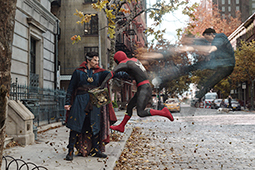
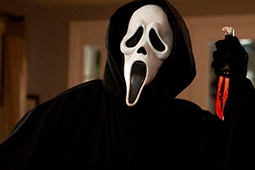
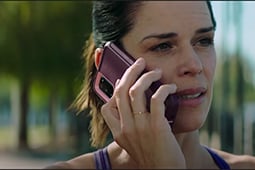

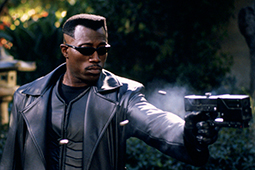



.jpg)
.png)



